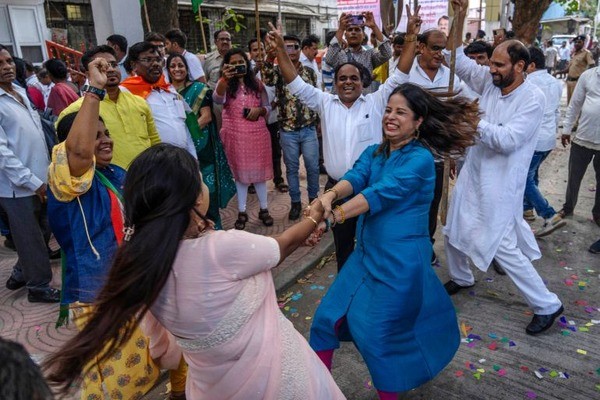Iran’s Unyielding Stance Against Israeli Aggression: A Complex Geopolitical Struggle
In the eyes of many, the Islamic Republic remains the last bastion in the Muslim world against unchecked Israeli aggression
Loading...

The victory of the BJP in the vote notwithstanding, its failure to secure a majority in the Lok Sabha suggests that there is a limit to the politics of hatred.
India’s six-week-long electoral marathon concluded on Saturday, with projections indicating a sweeping victory for the ruling Bharatiya Janata Party (BJP). Throughout the campaign, BJP leaders, buoyed by Prime Minister Narendra Modi's influence, had openly articulated their ambition to secure 400 seats in the 543-seat Lok Sabha, the lower house of the Indian Parliament. However, the final outcome didn't align with their aspirations.
Official results revealed on Tuesday depicted a different picture, with the BJP clinching 240 seats, a decrease of 63 seats from the 2019 elections. This shortfall deprived the party of the majority it had maintained for the past decade. While it still retains the ability to form the next government with its allies, it's evident that Indian voters have refrained from granting it the resounding mandate it sought.
Rather than endorsing a singular ideology or voice, the electorate has revitalized the essence of democracy. They've reaffirmed that democracy thrives on the coexistence of diverse perspectives and voices. They've underscored their rejection of isolating any religious community and mobilizing the majority against them, thereby offering hope for a secular India even under a new BJP administration.
The electoral campaign leading up to this juncture was marked by its extraordinary nature. Modi personalized the election, positioning himself as the central figure and urging voters across constituencies to perceive their ballot as a vote for him, with all candidates merely serving as his proxies.
In his campaign, Modi unabashedly projected his imperial ambitions, portraying himself as a Hindu emperor seeking retribution for past injustices attributed to the Mughal era. He propagated the narrative of establishing Hindu dominance under his leadership, painting a picture of an imminent Hindu nation that necessitated his continued tenure.
Simultaneously, Modi engaged in rhetoric targeting the Muslim community, employing divisive language and fearmongering tactics. His attempts to polarize voters along religious lines, however, backfired. Despite seeking an anti-Muslim mandate, Modi failed to garner unequivocal support in this regard, signaling a limitation to the ascendancy of hate politics in India.
Moreover, discontent among the youth, exacerbated by economic challenges, permeated the electorate. Many viewed Modi's emphasis on Hindu nationalism and anti-Muslim rhetoric as a diversion from addressing pressing economic issues, prompting a backlash against his administration.
Symbolically significant defeats, such as in the Ayodhya constituency, underscored the erosion of BJP's dominance in areas historically associated with Hindu nationalist fervor. The narrow margin of victory in Modi's own constituency further underscores the diminishing aura of invincibility surrounding him.
Additionally, apprehensions about potential constitutional amendments under a BJP majority prompted opposition and marginalized communities to rally against the ruling party. Despite facing myriad challenges, the opposition managed to consolidate support and improve its standing in the Lok Sabha, albeit not enough to secure victory.
The election process was marred by allegations of media bias, government interference, and electoral irregularities, raising concerns about the integrity of the democratic process.
Ultimately, the message from Indian voters is clear: they demand a return to civility, respect, and pluralism in politics. They've rejected the BJP's divisive rhetoric and signaled a commitment to safeguarding the constitutional principles of secularism and minority rights. This mandate presents an opportunity for the BJP to transcend Modi's authoritarian grip and operate as a more inclusive political entity.
In essence, these election results offer India the prospect of healing from the wounds inflicted by a decade of Hindu nationalist politics, reaffirming the nation's commitment to its constitutional ideals of equality, liberty, and fraternity.
In the eyes of many, the Islamic Republic remains the last bastion in the Muslim world against unchecked Israeli aggression
Analysts say US push for Gaza post-war phase is ‘unrealistic’ as Israel vows to continue fighting in besieged territory.
And recent Iraqi history can tell us how.
